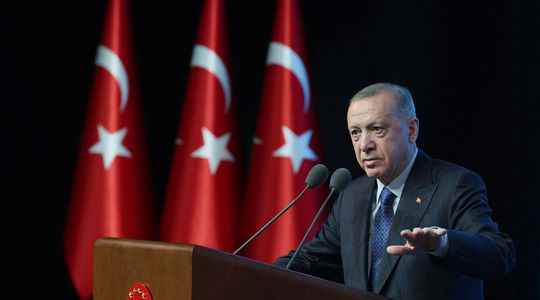Finnish and Swedish diplomats risk heatstroke this week. Two Scandinavian delegations fly to Ankara and, in addition to the summer temperatures of Turkey, the atmosphere is likely to be boiling there.
After decades of neutrality, the two Nordic countries decided to apply for NATO membership on May 15, but Western euphoria was quickly dampened by Recep Tayyip Erdogan. The next day, the Turkish president announced that his country would oppose these arrivals in the Atlantic Alliance, and that Scandinavian diplomats “shouldn’t even bother to make the trip to Ankara…”
The threat of a Turkish veto, initially minimized by Western diplomats, could quickly turn into a headache for the twenty-nine other member countries of NATO. Erdogan accuses Finland, but above all Sweden, of “supporting terrorism”, in particular by harboring members of the Kurdish organization of the PKK and sympathizers of his former ally, the preacher Fethullah Gulen. “With these declarations on the presence of the PKK in Scandinavia, Erdogan is above all addressing his nationalist supporters in Turkey”, points out Karabekir Akkoyunlu, professor of international relations at SOAS University of London.
“The rather unexpected opposition of Turkey to the accession of Finland and Sweden to NATO must first be attributed to the context of domestic politics, which sees President Erdogan and his party, the AKP , in difficulty for the presidential and legislative elections of 2023 and in the very unfavorable economic situation, suggests Marc Pierini, researcher with Carnegie Europe and former ambassador of the European Union in Turkey.In these turbulences, a ‘strong’ power which affirms its opposition to an enlargement of NATO while referring to the fight against the Kurdish PKK and the Gülen movement probably expects a resurgence in popularity with its electorate.
Erdogan, a leader strengthened by the war in Ukraine
Sweden and Finland have declared their surprise after the words of the Turkish president, who would have given them the green light during telephone discussions in recent weeks. This reversal marks the new geopolitical scale taken by Ankara with the war in Ukraine, where Erdogan has established himself as an indispensable mediator between kyiv and Moscow, but also between Moscow and the West. “Turkey is showing that it matters, that its opinion is important and it is also seeking to settle accounts with Sweden, says Bayram Balci, director of the French Institute for Anatolian Studies (IFEA), in Istanbul. When Erdogan says that Westerners and Swedes support Turkey’s enemies, he is not entirely wrong: Sweden, in difficulty with Russia, is asking for NATO protection with Turkey’s approval, but the Swedes are not are not really concerned about the security of Turkey, which is under pressure and attacks from the PKK, a terrorist organization tolerated by Sweden.”
Erdogan’s message is also addressed to Vladimir Putin, with whom the Turkish president takes every precaution. “Ankara fears the reaction of Russia, whose forces encircle Turkey, supports Bayram Balci: the Russians are in the Caucasus, in the Black Sea and Syria has become a Russian protectorate. Overnight, Russia can attack the city from Idlib and send 2 million Syrian refugees to Turkey, which already hosts 4 million. Europeans do not perceive these threats for the country.” Not to mention the economic risk that weighs on Turkey, already mired in an unprecedented crisis and dependent on Russian gas.
On a thread, as usual, Erdogan is not afraid to offend his Western allies. On the contrary, he hopes to make the most of this blackmail for the accession of Sweden and Finland, without having much to lose. “Erdogan realizes that his position has been strengthened vis-à-vis NATO, the West and the United States since the beginning of the Russian invasion of Ukraine, and he wants to take advantage of this, without must have a clear strategy in mind, judge Karabekir Akkoyunlu. The West listens to him more and takes his demands into account. For example, the Biden administration is now encouraging the US Congress to authorize the sale of F-16 planes to the Turkey, stuck so far. Erdogan may want to increase gains.”
The specialist in diplomatic crises
As usual, the Turkish president assumes the risk of not sparing his NATO allies. In 2009, it took a strong intervention from Barack Obama for Turkey to withdraw its objections to the appointment of Dane Anders Fogh Rasmussen as Secretary General at the last minute. The incursions of his warships into Greek and Cypriot waters, or his attacks on Kurdish forces in Syria, had prompted Emmanuel Macron to declare NATO “brain dead” at the end of 2019…
By rejecting the accession of the Scandinavians, perceived as a major step forward by all the other member countries, Erdogan is playing with fire. “Obviously, this initiative creates a manifest malaise within NATO because, despite the denials of the entourage of the Turkish president, the objection to the accession of Finland and Sweden (at the very moment when the exactions of the Russian forces on the civilian populations) inevitably appears as support for the Kremlin in the name of a policy of balance that is less and less defensible”, considers Marc Pierini.
The big question remains how far the Turkish president will go in his opposition to Sweden and Finland. A NATO summit is scheduled for the end of June, and negotiations with Ankara already promise to last several weeks. “A diplomatic crisis never bothers Erdogan, on the contrary he adores them, underlines Karabekir Akkoyunlu. But I would not be surprised if, on the day of the vote, Turkey aligns itself with the other members of NATO.”
